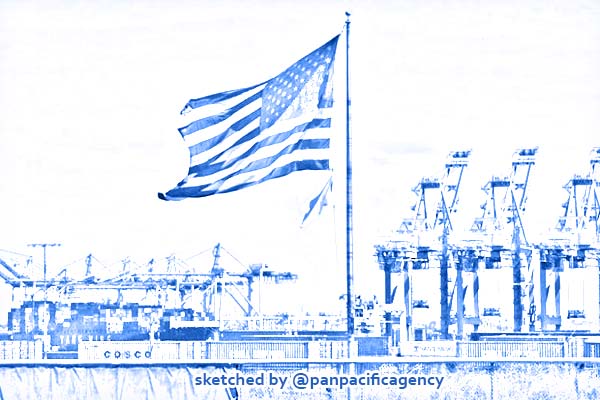China issues second list of tariff exemptions for some US products from May 19

The decision comes as the US and China are expected to meet for high-level trade talks next month and as both sides have toned down the rhetoric that has defined the year-long conflict. PHOTO: AFP. Sketched by the Pan Pacific Agency.
BEIJING, May 12, 2020, China Daily, SCMP. The Customs Tariff Commission of China’s State Council announced the second tariff exemption list of US products on Tuesday, China Daily reported. Tariffs will effective from May 19 for one year, South China Morning Post reported.
There are 79 products in total on the list published on Tuesday by the Ministry of Finance, including rare earth mineral ores, aircraft radar equipment, semiconductor parts, medical disinfectants, and a range of precious metals, chemical and petrochemical products.
Importers in China must apply to the General Administration of Customs within six months of the announcement to be considered for waivers.
The first batch of exclusions were announced in September 2019, and included major agricultural commodities such as soybeans and pork, as well as petrochemical products.
The announcement comes at a heated moment for the United States and China, with sharpened rhetoric prevalent on both sides. US President Donald Trump last week threatened to tear up the phase one trade deal, signed in January, should China not increase its imports of US goods, as per the purchasing agreement element of the deal.
With supply chains on both sides severely disrupted by the coronavirus outbreak, bilateral trade shrunk in the first four months of the year.
China’s imports of US goods fell by 11.1 per cent in April, customs data released last week showed, and by a colossal 85.5 per cent in March. Given that China imported much fewer goods from China in 2019 than it did in 2017 – the baseline scenario used to map out the terms of the trade deal – it is nowhere near meeting the targets.
An editorial in the state-run Global Times on Monday suggested that dissenting voices within and advising the Chinese government were pushing for renegotiation of the phase one deal, a suggestion that was swiftly shot down by Trump at a press conference in Washington on Monday.
‘I’m a little upset with China’, some of Trump’s more memorable quotes on the coronavirus pandemic
Among the other US goods to be offered exemptions from trade war tariffs are recombinant human insulin, halogen light bulbs for trains, ships and aircraft, electricity generators, flight data recorders, certain digital cameras, and gold ore.
Top negotiators including China’s Vice-Premier Liu He and US Treasury Secretary Steven Mnuchin and US Trade Representative Robert Lighthizer held a telephone call on Friday, the first since the deal was signed in January.
A Chinese statement carried by state media said they would “create favourable conditions to implement the phase one trade deal”, at a time when superpower tensions have been running high over the handling of the coronavirus pandemic.
In a statement posted to its website, the Office of the US Trade Representative added that “both sides agreed that good progress is being made on creating the governmental infrastructures necessary to make the agreement a success.”
Chinese analysts on Tuesday downplayed the prospect of a collapse in the trade deal, which has only been in effect since February 15, and which took more than a year to negotiate.
Chen Fengying, a senior researcher with the China Institute of Contemporary International Relations, said that despite the rhetoric, there is no immediate threat to the deal, However, he did suggest that there should be room to discuss the purchase clause in light of the coronavirus disruption.
“It is not a normal time for either country. China is still keen on buying American commodities such as pork and soybeans, but the question is whether the US can produce enough and it deliver to China amid the coronavirus pandemic,” she said. “The massive purchase is the hardest element [of the deal] to fulfil, accordingly fuelling calls for renegotiation.”
Additional reporting by Frank Tang